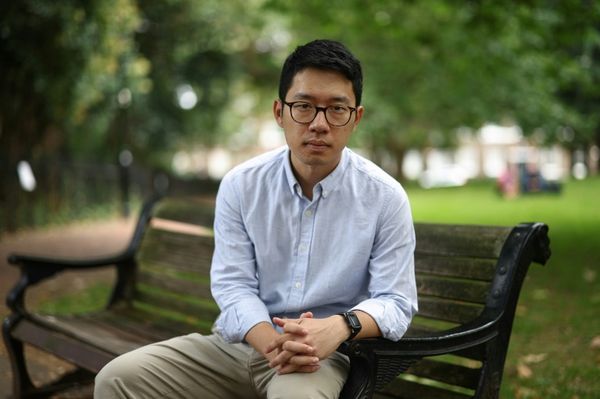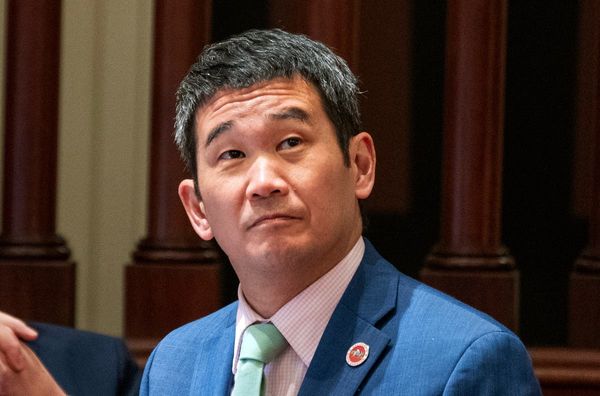
As Nia scrambled to the top of a Dubai compound wall, she paused for a moment. Behind her were a group of fellow Kenyan women, also being held captive, who had helped her climb up. On the other side of the wall there was an expanse of busy streets in an unfamiliar land.
“Jump!” the women urged, “Go, go, go.” And she did.
In 2021, Nia, 27, arrived in the United Arab Emirates (UAE) to be a domestic worker. Her aim was to make enough money to secure a better future for herself and her family. She believed a job was waiting for her when she landed but, instead, staff from the employment agency Shamma Almahairi Domestic Workers Services Center took her to its compound.
Once there, she claims staff swiftly confiscated her phone and passport, before locking her in a cramped room with more than 12 other women. Nia says she languished there for three months, without a job or salary, until she could tolerate it no longer.
“They told us the agency belongs to the government, and there was nothing we could do,” says Nia, who escaped while the staff were on a lunch break. “I had to run.”
Abuse within the UAE’s kafala system, which ties low-paid migrant workers’ legal status to their employers, has been well-documented. Domestic workers are particularly vulnerable to abuse within their employers’ home, and those who do leave without their employers’ permission face criminal charges for “absconding”, punishable by fines, arrest, detention and deportation. Less well known are the conditions within the recruitment centres where women are kept, sometimes for months, until an employer is found.
The UAE has a population of 10.1 million, with migrants accounting for 90% of its inhabitants. Domestic workers are in high demand, making it a lucrative trade for recruitment agencies.
Domestic worker recruitment agencies require a licence from the government to operate. However, the Guardian has spoken with six women from Kenya and Uganda, including Nia, who alleged that they were abused, denied proper food or medical care, beaten and detained at Shamma Almahairi between 2020 and 2021, while the agency was licensed. Their names have been changed to protect their identities.
“The kafala system means that domestic workers are no longer trapped just by their employer, but also now by recruiters,” says Rothna Begum, a senior women’s rights researcher at Human Rights Watch. “This leaves them exposed to further abuse, including trafficking into forced labour, by recruiters in addition to their employers, and their rights under law become meaningless.”

When they arrived in Dubai, the women were shocked by the treatment they were subjected to, which included insufficient food. “We were given one plate to share between about eight people,” says Mariam, 32, from Kampala, who arrived in the UAE in November 2020. “We had to fight over the food. I cried because of that plate.”
Each day, the women say they would be driven from their accommodation to the agency in the Jumeirah area of Dubai. There, they’d be held in a room and brought out if a potential customer wanted to interview them.
The women were apparently powerless in deciding which employer they may want to work for and live with. They also claim the company’s rules meant they would not get any days off, they say, despite the UAE’s regulations stipulating workers should get one day to rest each week. Meanwhile, their families back home were worried about them. This was exacerbated by the fact they weren’t in regular contact because their phones were confiscated.
These matters were put to Shamma Almahairi and did not respond to a request request for comment.
When an Indonesian woman called Christina tried to escape the Shamma Almahairi accommodation in January 2021, she was allegedly subjected to a serious beating, several women interviewed said.
Christina, in her 50s, decided to flee while hanging laundry on the rooftop, by crossing over to the neighbouring building. She was caught. An Egyptian manager of the agency then allegedly administered the beating while the other women were made to watch.
“He was kicking her stomach,” says Catherine, 44. “The lady was crying because she was in pain. Later, he dragged her outside and pushed her inside a car. We were crying, but we couldn’t do anything to help.”
Christina never returned to the accommodation, and the women did not see her again. If women were returned by their employers, they were also beaten.
“They beat you when you go back to the office from the sponsor. It’s normal for them to beat housemaids in front of other staff,” claims Mercy, 27, from Kenya. “They would beat ladies in front of us as a warning.”
The UAE government revoked Shamma Almahairi’s licence to operate in September, due to unpaid fines and other bureaucratic offences. Yet, women are still apparently being held in its accommodation, claims Mercy.

“One of my friends has been there for three months and another has been held there for almost three weeks,” she adds. “I don’t know how I can help them.” Four of the women interviewed are stranded in the UAE and unable to exit the country to return home without paying large fines or possibly serving jail terms because of their irregular visa status, they say.
A spokesperson for the UAE government told the Guardian: “The UAE maintains a zero-tolerance policy towards workplace abuse.
“UAE law also prohibits any form of abuse towards employees who undertake workshops regarding their rights and ways to report abuse.
“We conduct comprehensive investigations whenever individuals and/or entities act in such a manner that contravenes UAE legislation. Those that are found to be at fault are held accountable in line with UAE law and legislation.
“The UAE continues to take active and resolute steps in implementing laws, regulations, and monitoring measures to enhance the working conditions of its labour force and address any gap.”

‘I tried to leave but they dragged me into the office’
Catherine arrived in Dubai from Kenya in October 2020. Her recruitment agency placed her in five different homes to work. None of the jobs lasted long, and most of her employers were abusive.
In the first house, she was given one meal each day, which was usually two slices of bread and black tea. CCTV cameras made it impossible for her to eat any additional food without her employer’s permission. She was locked in her bedroom at night.
“One day, when I was ironing, she [her employer] came next to me and started spitting on my face,” she says. “I asked her, why are you doing this to me? She shouted and left the room.”
Catherine asked to have a day off on Christmas Day so that she could celebrate with friends. Initially, her employer agreed but then changed her mind on the morning of 25 December.
“She yelled at me and chased me outside. I was shocked, and she followed me, shouting that I should leave. The next thing I knew, she was throwing my belongings outside.”
In one house, Catherine’s employer hit her over the head with a frying pan for cleaning it incorrectly. The same employer made her sleep in a closet and confiscated her phone, she said. She decided to run away, and took a taxi to her recruitment agency’s office. Despite this, staff at the Shamma Almahairi agency punished her for leaving.
“The staff asked me to go back to my employer’s house, and I refused. I tried to take my bag and leave, but they dragged me into the office,” she says. “They were shouting and insulting me and claiming I didn’t want to work.”
* The names of all those interviewed have been changed







